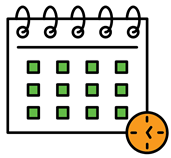As part of the planning for you to take your baby home, the team on the unit will support you to feel ready. Everyone will want to help you to feel as confident and as prepared as possible for the big day.
Ask as many questions as you need to - and ask again if you aren’t quite sure. There really is no such thing as a ‘silly’ question especially if it makes the move to home easier for you all.
Some babies might continue to have extra health needs when they go home. The team will teach you any skills you need and make sure you know who will be providing any other care and follow up your baby will need.
It is usual to feel a little worried about taking your baby home, especially after a stay at the neonatal unit. Remember there is always help available from professionals but don’t be afraid to accept practical help from your family and friends too.
It might help you to feel more connected to your baby whilst they are in hospital by doing some of the things that only you as a parent can do.
Talk to your partner / family about how you want the first few days to be. Can they be at home to offer extra support?
Sometimes parental leave may have been used up in the early days whilst your baby was unwell. It is still worth talking to your employer who may help you come up with a plan for you to have special family time.
 Take some time to talk about your experience, your hopes and your worries.
Take some time to talk about your experience, your hopes and your worries.It can help to recognise that this can be a stressful and tiring time and as a family you are doing your best. Be kind and encourage each other it is easier when you work as a team. If you recognise that you or your partner is struggling at this time don’t be afraid to ask for help, advice and support.
Remember - As a family you have been through a big life event and it may take time to feel settled again.
Learning Extra Skills
Some babies might still need tube feeding, oxygen therapy or other extra care once they get home. Your baby may need medication and / or vitamin supplements.
The staff will show you how much and how to give these, as well as how to get any ‘repeat prescriptions. They will make sure you feel confident with all aspects of your baby’s care before you go home.
Rooming In
It is often possible for you to stay on the unit in the family room for a night or two so you get used to caring for your baby with the staff on hand. It is great if both parents can do this and get to share the special time and learning.
Safe Sleep & Reducing The Risk Of SIDs
Make sure your baby has a safe place to sleep. This reduces the risk of SIDs (sudden infant death syndrome). This is important for all babies but especially those who were born earlier and / or smaller than expected.
Babies should sleep on a firm, flat surface that is especially designed for babies.
During your baby’s stay on the unit they may have been nursed on their tummies. They do this for medical reasons and are able to do so only because of the specialist monitoring used. By the time your baby goes home your baby should be placed on their back to sleep.
One of the most important ways to reduce the risk of SIDs and keep your baby well is for them to be brought up in ‘smoke free’ environment – this means no one smokes in or near the home and ideally their carers are non-smokers.
As you get ready to bring your baby home make sure that everyone knows your home is ‘smoke free’ to keep your baby safe and well. If you or others want to stop smoking get in touch with Smoke Free Norfolk for free support and advice.
The Lullaby Trust has all the most up to date information on how to keep the risk from SIDs as low as possible, including extra information for babies born early or small and for multiple births too.
Appointments
 Your baby may have some extra check ups and follow up appointments after they go home.
Your baby may have some extra check ups and follow up appointments after they go home.
The staff on the unit will let you know what your baby needs and when to expect them to happen.
It is a good idea to get a family calendar, diary or set phone reminders to keep on track.
You can contact the Healthy Child Programme by calling Just One Number on 0300 300 0123 or texting Parentline on 07520 631590. Our opening hours are 8am-6pm Monday-Friday (excluding bank holidays) and 9am-1pm on Saturdays.
The Hamlet Centre provides nurture groups for babies and families who have spent time on the Neonatal Unit. They cover a range of topics that will be useful to you like weaning and baby massage as well as giving you the chance to talk with other families who have had a similar experience to you. The service is available to families living in Norfolk and Waveney.
'All Things NICU Norfolk' Facebook group - A support group for anyone connected to NICU, including parents and professionals. The group shares information about development and promotes local groups and fundraising.
Early Childhood and Family Service supports all Norfolk families with children under 5 years.
To speak to other Norfolk parents and carers, you can join our online community forum below.